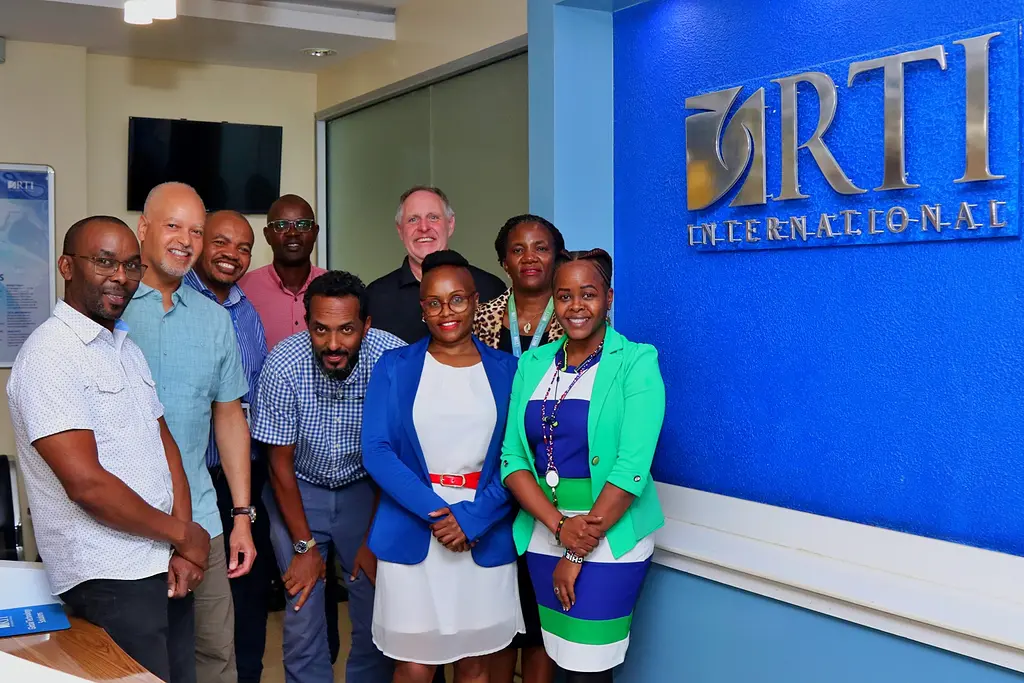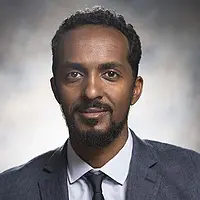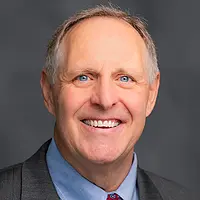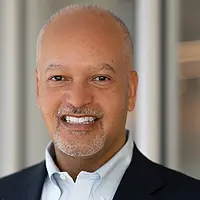
Tim Gabel and Paul Weisenfeld meet with RTI staff members at RTI's Regional Office in Nairobi, Kenya. Pictured (L-R) are Anthony Kabura, Paul, Eric Githinji, Jabez Ojowa, Moges Gebremedhin, Tim, Jennifer Wanjiru, Lydiah Were, and Nancy Allan. Photo credit: Edwin Birundu/RTI International
Interview conducted by Moges Gebremedhin, International Regional Office Director - Africa
As RTI’s regional director for Africa, I was thrilled to welcome RTI executive leaders Tim Gabel and Paul Weisenfeld to East Africa last month.
Our regional office and project teams hosted the two in Tanzania, Kenya, and Ethiopia, where they experienced first-hand RTI’s work and the impact of the programs we implement. It was also an opportunity for them to see locally led development in action at a time when RTI is deepening its commitment to true partnership with local organizations and shifting power to local actors.
At the end of the trip, I asked Tim and Paul for their insights and reflections, and what they’re most proud of about RTI’s work as a global research institute and leading international development organization. Below is an excerpt from our Q&A.
Moges: Why was it important to you to visit East Africa? What was the highlight of the trip for you?
Tim: RTI has a proud history working with governments, local partners, and donors like USAID throughout East Africa. This was my first major international trip since I became RTI’s CEO, and it was important for me to spend time hearing from our amazing staff members in the region, connecting with partners, and experiencing the work they are doing. Quality implementation and data-driven research are the foundation of what RTI does, and I was struck by the passion of our teams and the sense of pride they had in knowing the work they do matters so much. Throughout the trip, I kept thinking how our organization and mission are so much bigger than ourselves. We saw many RTI-led programs, from wildlife conservation, food security, and sanitation and health, to disease eradication, energy access, education, and more. The through line was the dedication among staff and partners to spur impact. We also saw how our work is making a difference for women and girls. While wildlife conservation may not be the first area that comes to mind when you think about gender programs, we heard from one of our partners in the USAID Tanzania Tuhifadhi Maliasili project about the work they’re doing with women and youth in the community to educate others to help with conservation. It was encouraging to see how each project we visited, no matter the sector, supported gender equity.
Paul: The highlight for me was seeing how committed our project teams are to making a difference in the local communities and beyond. It was clear they want RTI leadership to be committed, too. When we visited the USAID-funded Western Kenya Sanitation Project, the team asked us to sign a billboard in indelible ink to say we’re committed to being champions for menstrual hygiene management. When we visited a partner community-based organization that provides health and education services, its leader asked us to hold hands and commit to being members of the organization. The work our team has done to build relationships with local partners was inspiring and really brought to life our commitment to locally led development.
Moges: How important are local partnerships to RTI and the work we do? What stood out to you during this trip about our partnerships?
Tim: Visiting with local partners underscored that alone we can do little, but together we can do so much. As a research institute, RTI has close partnerships with universities around the world that help us do more together. In Tanzania, we visited the Muhimbili National Hospital and the Muhimbili University of the Health and Allied Sciences (MUHAS), a hospital and teaching university that RTI has partnered with over the past decade to address stigma and discrimination toward people living with HIV. Together, we have developed health facility HIV stigma-reduction interventions with funding from USAID and the U.S. President’s Emergency Plan for AIDS Relief (PEPFAR) that we are now, with funding from the National Institutes of Health (NIH), Fogarty International Center (FIC), and National Institute on Drug Abuse, adapting to address substance-use stigma in HIV treatment clinics. Along with colleagues at Duke University and MUHAS, and with funding from NIH and FIC, we adapted and are now testing an internalized stigma intervention for women living with HIV that was developed with Black women living with HIV in the Southern U.S. to now help women in Tanzania. These are great examples of working with local partners and bringing together diverse knowledge and expertise to make an impact.
Paul: Our local partners have the most in-depth understanding of how to improve lives and livelihoods in their own communities. We saw that on full display throughout this trip. Part of our commitment to locally led development is strengthening partnerships with these local organizations in the countries where we work. That includes co-creating 100% of our international development proposals and projects with local stakeholders, as well as investing in long-term relationships with local partners regardless of whether we have an active project with them in the countries where RTI is most active.
Moges: RTI recently hosted a learning exchange on locally led development in Nairobi. A portion of the event challenged RTI staff and partners to reflect on the discussion with local leaders and practitioners and consider what they learned about barriers to and opportunities for expanding locally led solutions in our work. In what other ways did you see locally led development in action?
Tim: Our approach to locally led development includes but is more than just “capacity strengthening.” We seek to build authentic, long-term partnerships with local public, private, and civil society organizations that span before, during, and after program implementation. We’re focused on the priorities of our partners and listening to them. I saw this in action in Ethiopia where we visited with our biggest partner on Feed the Future Ethiopia Transforming Agriculture, USAID’s flagship agriculture program in the country. Our partner, First Consult, hosted us for a coffee meeting and shared many important lessons and suggestions on how we can build on our partnership specifically, and also what motivates local partners and what matters to them.
Paul: RTI’s commitment to locally led development aims to put local partners in the driver’s seat of development. We want to shift power to local actors so that they are leading solutions that spur development and sustain results. One way we do this is through dedicating substantial portions of project funding to local actors and ensuring they have a leading role in implementation in areas that match their expertise. For example, in Tanzania, we visited many local partners in wildlife conservation, health research, and education. Many of them are important actors from the public space. In Kenya, we had a chance to visit partners who were private sector actors such as small businesses, entrepreneurs, suppliers, and other market actors. Whether through grants or subcontracts and technical assistance, it was clear all these partners were not just receiving critical technical and financial support, but also leading us as they pursue their mission.
Moges: What are a few stories of impact that you took away from this trip?
Tim: It was uplifting to see and experience RTI’s work in these countries first-hand. I left inspired with examples of the real impact RTI is having in East Africa, including improving health services for those affected by neglected tropical diseases. It’s a great tragedy that more than 1.7 billion people are still afflicted by a group of diseases, several of which can be eliminated, largely because these diseases do not receive sufficient attention and investment and occur among neglected populations.
In a meeting with staff from the USAID Act to End Neglected Tropical Diseases (NTDs) | East program, led by RTI, we learned about their support to governments to control and eliminate these diseases and strengthen the delivery of NTD services. The Act | East team was in Arusha, Tanzania, to pilot a new training on developing hyper-local solutions for medicine distribution, which includes bringing local leaders together to share ideas and using local data to inform planning. Across East Africa, the team is helping governments coordinate and collaborate on treatment to ensure everyone is reached, including migratory groups like the Maasai in Tanzania and Kenya.
Paul: Our visit to a primary school in Zanzibar, Tanzania, really stood out to me. We became students for the day, learning from the teachers at that school about how they’re improving literacy and numeracy among their students with help from USAID Jifunze Uelewe. RTI is building on the legacy of two previous USAID programs to further the impact of accessible and inclusive learning resources in the country.
It reminded me of another USAID education project in Kenya that wrapped up a few weeks before our trip. With strong teaching and learning materials, instructional support for teachers, and capacity strengthening in the Ministry of Health, the Tusome Early Grade Reading Activity tripled the share of learners who could read fluently in Kiswahili and doubled the share of learners reading fluently in English – the highest levels of improvement in reading ever achieved by a USAID project. When it comes to our drive for impact at RTI, this is exactly the type of difference we seek to make.


